Pages 76-83
by Ian Peart & Saadat Ibrahimova
Since its origins in 1898, Azerbaijan cinema has had an eventful history. Perhaps surprisingly for those still influenced by stereotypical Cold War views of the Soviet Union, there were films made on national themes - Babek, Nasimi, Dali Kur (Crazy Kur - the Kur being the main river running through Azerbaijan). Independent Azerbaijan, too, despite all the difficulties it faced following the break-up of the Union, has made its mark - even on Hollywood: Rustam Ibragimbekov was an Oscar winner for his screenplay for the film Burnt By The Sun and this year The Fortress, directed by Shamil Najafzadeh, is among the films up for nomination for Best Foreign Film. The country´s potential as a film set has also been recognised: German director Veit Helmer came to Lahij to film his Absurdistan and rumours abound about a film version of the classic Azerbaijani novel, Ali and Nino.
But film-making is an expensive business and it is still a mighty struggle for would-be directors in Azerbaijan to raise the funds to convert their ideas from dream to screen. It takes a particular determination, or obsession, to overcome the financial barriers, before even thinking about how to get the final vision shown. We were very happy to hear, recently, of a film nearing completion and to agree to help with the translation of dialogue for subtitles. Of course we realised that this was a very low-budget film and wondered about the quality that could be produced. But one viewing was enough to see that this was a project - and a director - of love and distinctive vision. The film The 40th Door is an involving and heartfelt tribute to the resilience of people struggling to make a living and to express themselves in the difficult early days of Azerbaijani independence. Its director, Elchin Musaoghlu, convinces you in no time at all, both on screen and in person, of his love for both his medium and the people he uses it to portray.
by Ian Peart & Saadat Ibrahimova
Since its origins in 1898, Azerbaijan cinema has had an eventful history. Perhaps surprisingly for those still influenced by stereotypical Cold War views of the Soviet Union, there were films made on national themes - Babek, Nasimi, Dali Kur (Crazy Kur - the Kur being the main river running through Azerbaijan). Independent Azerbaijan, too, despite all the difficulties it faced following the break-up of the Union, has made its mark - even on Hollywood: Rustam Ibragimbekov was an Oscar winner for his screenplay for the film Burnt By The Sun and this year The Fortress, directed by Shamil Najafzadeh, is among the films up for nomination for Best Foreign Film. The country´s potential as a film set has also been recognised: German director Veit Helmer came to Lahij to film his Absurdistan and rumours abound about a film version of the classic Azerbaijani novel, Ali and Nino.
But film-making is an expensive business and it is still a mighty struggle for would-be directors in Azerbaijan to raise the funds to convert their ideas from dream to screen. It takes a particular determination, or obsession, to overcome the financial barriers, before even thinking about how to get the final vision shown. We were very happy to hear, recently, of a film nearing completion and to agree to help with the translation of dialogue for subtitles. Of course we realised that this was a very low-budget film and wondered about the quality that could be produced. But one viewing was enough to see that this was a project - and a director - of love and distinctive vision. The film The 40th Door is an involving and heartfelt tribute to the resilience of people struggling to make a living and to express themselves in the difficult early days of Azerbaijani independence. Its director, Elchin Musaoghlu, convinces you in no time at all, both on screen and in person, of his love for both his medium and the people he uses it to portray.
A love of film
Born in the year Tofiq Bahramov´s decision helped England win the World Cup (1966), Elchin says that Soviet films on television - mainly war films and the excellent animations made at that time - took complete control of his imagination and convinced him, by the age of nine or ten, that his destiny was to be a film director. Even before then, however, he remembers visits to his grandparents in Lankaran when he would hang curtains between trees in the garden and recreate the works of Uzeyir Hajibayov for local children who had to bring a ´ticket´ - a small toy, or sweets - to gain entry."I would get into trouble for digging through my grandparents´ precious trunk of dress materials, and sometimes cutting them up for curtains and costumes, but I should be grateful for their patience," he recalls.
Studying the films he watched to work out how they were made, he would also stay after games had finished in his school playground in Patamdar to act out scenes from the films he imagined making.
"I also read a lot, like most Soviet children at that time. I read all the children´s tales: I knew Andersen, Grimm, Munchausen, the 1001 Nights….Nowadays they don´t seem to read as much, I can´t imagine how young people can live without books."
These reminiscences were sparked by our original question about his time at university, (we imagined that his interest in film-making had been a later development) and we did eventually discover that Elchin had studied at the Art and Culture University. His interests were ahead of his environment, however, as there was then no film department, and he studied theatre. He was not frustrated by this, "Theatre taught me contact with people. I know many directors who work in both theatre and cinema. I would like to work on the stage; now I am older perhaps it´s time to take on something really serious. I do miss that live communication. I like the idea of the Eastern theatre where the actors and audience are only two metres apart. I like the ideas of Brecht, with the audience all around, but also Artaud, Stanislavsky…. different styles."
Even at university, film was not to be denied and a group was formed – at its centre a Krasnogorsk 16mm camera. "We all worked together, taking on every job: acting, directing, design etc. We were prize winners at a Moscow festival for amateur film-makers. Our rector, Aslan Aslanov, helped us with expenses and we were presented with our prizes in Baku."
For the last year of his course, Elchin was selected as one of the two best students and sent to study at the State Institute of Arts and Culture in Moscow. "I learned a lot in that year - it was very strict, but very interesting. I also managed to watch a lot of films that weren´t available in Baku!"
Documentaries
Following graduation, short stays at a couple of studios gave Elchin an apprenticeship in making documentaries. Times were very hard in the early 1990s and film-making was naturally not high on the list of priorities for the state or its citizens fighting for survival; this meant that resources were slim, but also that there were opportunities for those with the drive to forge ahead and take on responsibility.Elchin´s arrival at the Azertelefilm studio in 1994 was, for him, the beginning of a most fruitful period of work. The head of the studio, Nazim Abbasov, was progressive in outlook, embracing new technology and keen to encourage younger directors as they produced films and documentaries for the AzTV channel.
In 1997, he directed A Grain of Sand, a documentary about the lives and aspirations of prisoners. This film, scripted by long-term collaborator Rafiq Hashimov and filmed by Elkhan Nabiyev, was to feature at four international festivals and also bring about some political change. But the process was not an easy one. Elchin and Hashimov had conceived the idea while walking home from AzTV, past the Martyrs´ Cemetery, to 20th January - salaries were paid at irregular intervals and often there was no money for bus fares. Once filming started - it took a year - they were frequently questioned by security personnel suspicious of their motives. To enlist support they took a number of women members of the Milli Majlis (parliament) to see conditions in the prisons for themselves. Questions were raised, the prison regime was changed and conditions were improved. The striking thing about this film is not so much the grim conditions in which prisoners were held, although the images are striking enough, but the recording of their hopes and dreams for the future. The points being that these prisoners are not one-dimensional blots on society but real, breathing individuals with the same hopes and needs as all of us and that they are as likely to respond to love and generosity as anyone else. A Grain of Sand was shown at the Oberhausen Film Festival in Germany in the same year (1997). The film-makers had to pay their own way there; they couldn´t even afford to dub the film, so they had someone reading live from a script during the showing.
Elchin refers to Belgian poet Henri Michaux and Goethe to partly explain the philosophy behind his films: ´When you want to know the whole, it is enough to see a part.´
Glass Toys (2003), a gentle, but highly effective 12-minute film, continues in this vein. It focuses on the simple pleasures that may be extracted from life in the otherwise unpromising environment of an orphanage.
Feature film
Explaining his move away from documentary and towards feature films, the director says, ´In some documentaries I realised I wanted to experiment and use some aspects of feature films…. I´m always looking for something in film. If I video a tree it´s a documentary, but I want something of myself in it.´Thus The 40th Door, his latest film, due for release in November, is a full-length feature film about the struggle of a teenager and his widowed mother to make a living on the edges of post-independence Baku. It has been made with valuable sponsorship and support from the Swiss Agency for Development and Cooperation´s Avanti Project, especially from Krzysztof Zanussi, responsible for film development in the South Caucasus. But, of course, the sponsorship is not to Hollywood proportions and many problems had to be overcome on the way. For example, in one sequence in the film, the two ´heroes´ enter a house, flop down in front of a television and we catch a glimpse of the popular cartoon they are watching. The question of copyright was raised, so the major media company was contacted, the nature of the project was described and they were asked for permission to use this four-second clip. Back came a fax requesting a sum which dropped jaws to the floor. Needless to say, the heroes have now been deprived of their cartoon. Like Glass Toys, there is an Elchin theme running through The 40th Door; ´If the young generation is good and honest, the future will be fine.´
The younger generation are to the fore in the film, played by non-professional actors who bring a very refreshing honesty to their roles and Elchin believes this is happening in real life, too. Despite the problems (principally financial) of the industry, he sees a rising generation of youth who bring to it a more natural approach and who also have the ´blood of their country in their veins´ - a pride in their national culture. He contrasts this with the situation in Soviet times when the film industry could often be in the hands of children of the elite, ´not of people from the people´. The difficulties may help ensure that those who do enter the industry do so ´for the love of film´.
Finally, Elchin is clearly a ´doer´ who does not wait for things to happen. He collaborated with Rain Sultanov on the latter´s recently released CD/DVD project A Tale of My Land. Although he is not due to be ´allocated´ another film for four years, in the meantime earning his crust with adverts and promotional films, it would be no surprise to see him working soon on another feature.
As he says, ´In the Koran, Allah says you will be given iron - you can use it for good or bad, it is your choice. In the Koran it says that you should not make images, but images are sent to us, so cinema may be used for good or bad, too. I think Allah will forgive me. All the holy books give people a choice - good or bad.´
The 40th Door, directed by Elchin Musaoghlu, is expected to be previewed in Baku in December and there are hopes it will be shown at the Berlin Film Festival in February 2009
* What’s behind the 40th Door? Dig out your book of fairy tales to find out - or look out for a showing of Elchin’s film.
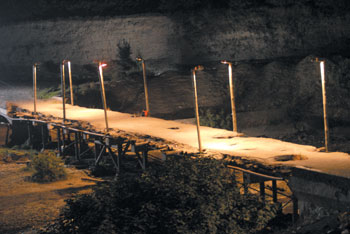
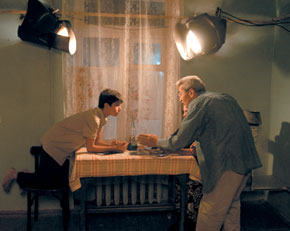
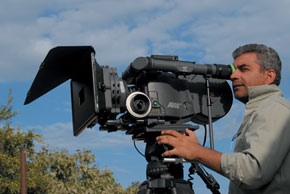
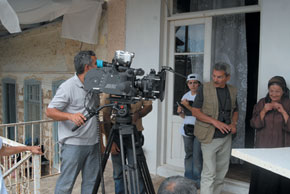
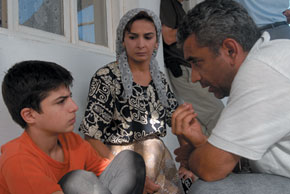
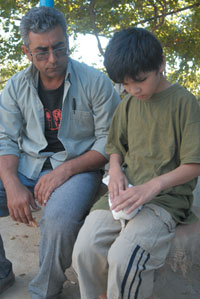

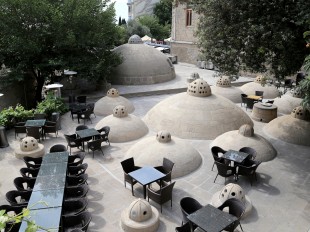
.jpg)